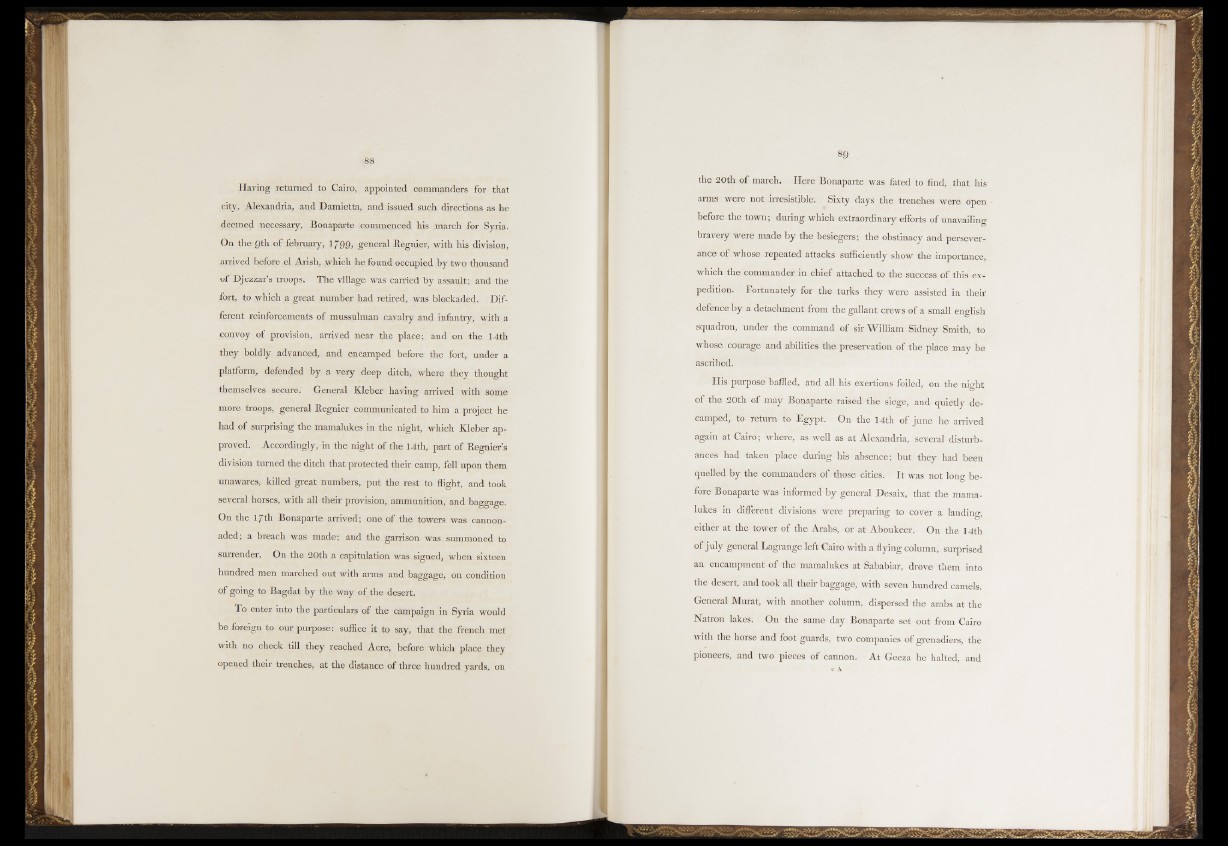
Having returned to Cairo, appointed commanders for that
city, Alexandria, and Damietta, and issued such directions as he
deemed necessary, Bonaparte commenced his march for Syria.
On the gth of february, 1f 99; general Regnier, with his division,
arrived before el Arish, which he found occupied by two thousand
of Djezzar’s troops. The village was carried by assault; and the
fort, to which a great number had retired, was blockaded. D ifferent
reinforcements of mussulman cavalry and infantry, with a
convoy of provision, arrived near the place; and on the 14th
they boldly advanced, and encamped before the fort, under a
platform, defended by a very deep ditch, where they thought
themselves secure. General Kleber having arrived with some
more troops, general Regnier communicated to him a project he
had of surprising the mamalukes in the night, which Kleber approved.
Accordingly, in the night of the 14th, part of Regnier’s
division turned the ditch that protected their camp, fell upon them
unawares, killed great numbers, put the rest to flight, and took
several horses, with all their provision, ammunition, and baggage.
On the l / t h Bonaparte arrived; one of the towers was cannonaded;
a breach was made; and the garrison was summoned to
surrender. On the 20th a capitulation was signed, when sixteen
hundred men marched out with arms and baggage, on condition
of going to Bagdat by the way of the desert.
To enter into the particulars of the campaign in Syria would
be foreign to our purpose: suffice it to say, that the french met
with no check till they reached Acre, before which place they
opened their trenches, at the distance of three hundred yards, on
the 20th of march. Here Bonaparte was fated to find, that his
arms were not irresistible. Sixty days the trenches were open
before the town; during which extraordinary efforts of unavailing
bravery were made by the besiegers; the obstinacy and perseverance
of whose repeated attacks sufficiently show the importance,
which the commander in chief attached to the success of this expedition.
Fortunately for the turks they were assisted in their
defence by a detachment from the gallant crews of a small english
squadron, under the command of sir William Sidney Smith, to
whose courage and abilities the preservation of the place may be
ascribed.
His purpose baffled, and all his exertions foiled, on the night
of the 20th of may Bonaparte raised the siege, and quietly decamped,
to return to Egypt. On the 14th of juue he arrived
again at Cairo; where, as well as at Alexandria, several disturbances
had taken place during his absence; but they had been
quelled by the commanders of those cities. I t was not long before
Bonaparte was informed by general Desaix, that the mamalukes
in different divisions were preparing to cover a landing,
either at the tower of the Arabs, or at Aboukeer. On the 14th
of july general Lagrange left Cairo with a flying column, surprised
an encampment of the mamalukes at Sababiar, drove them into
the desert, and took all their baggage, with seven hundred camels.
General Murat, with another column, dispersed the arabs at the
Natron lakes. On the same day Bonaparte set out from Cairo
with the horse and foot guards, two companies of grenadiers, the
pioneers, and two pieces of cannon. At Geeza he halted, and
2 A